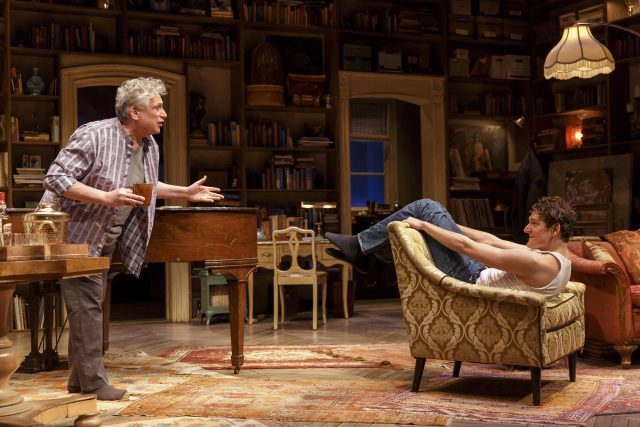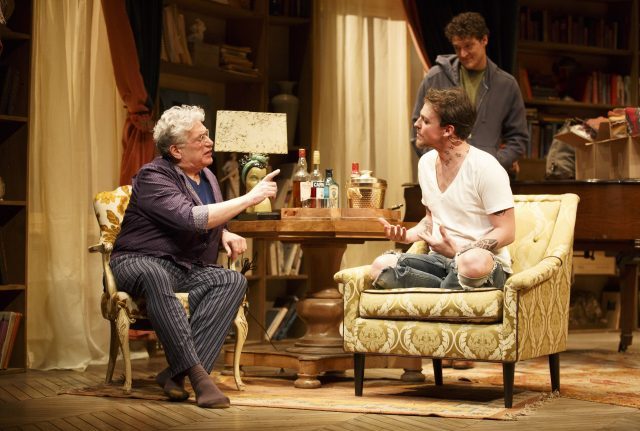
Beauregard (Harvey Fierstein) shares his fears and desires with younger lover Rufus (Gabriel Ebert) in Martin Sherman’s Gently Down the Stream (photo by Joan Marcus)
Martinson Theater, the Public Theater
425 Lafayette St. at Astor P.
Tuesday through Sunday through May 21, $95
212-539-8500
publictheater.org
Philadelphia-born, London-based playwright and screenwriter Martin Sherman recounts the often unspoken history of gay life over the last century through the memories of an expat cocktail pianist living and working in London in the moving and very funny Gently Down the Stream, making its world premiere at the Public Theater. Four-time Tony winner Harvey Fierstein returns to the stage for the first time in six years as Beauregard, a former piano player for gay icon Mabel Mercer who now tickles the ivories in a local club. It’s 2001, and the chunky sixty-one-year-old Beau, who speaks in a raspy southern drawl that mixes New Orleans with Brooklyn, has just had an assignation with slim twenty-eight-year-old mergers and acquisitions lawyer Rufus (Gabriel Ebert), who found Beau on an internet dating site. “You’re so young you make me feel like a priest,” Beau tells Rufus, who wants to stick around a while and hear some of Beau’s stories, not only about Mercer, but about his experiences as a gay man. “If it was a love that daren’t speak its name, it was only the name itself that was unspoken; everything else had just been expressed rather eloquently by this rather large, elderly lady with over-pronounced vowels sitting in an old, comfortable chair,” he says, referring to Mercer. Beau is hesitant at first to open up — “I thought I had arranged for a fuck, not an interview,” he complains — but soon he is sharing tales about Mercer, James Baldwin, and, in long, poignant monologues, former companions George, Kip, and Sam, whose lives sum up decades of gay history. “You’re turning me into Grey Gardens. The past is dead,” Beau argues, but he keeps talking, occasionally sitting on a stool, directly addressing the audience. The cynical and jaded Beau is not looking for a relationship, even as Rufus begins moving in. “Why do you think everything ends badly?” Rufus asks. “Because it always does,” Beau responds. Beau’s unwillingness to commit to Rufus leads to the arrival of performance artist Harry (Christopher Sears) and the formation of a rather modern family.

Beauregard (Harvey Fierstein), Harry (Christopher Sears), and Rufus (Gabriel Ebert) form a modern-day family in play that explores gay history (photo by Joan Marcus)
Gently Down the Stream takes place between 2001 and 2014 in Beau’s spacious living room, elegantly designed by Tony winner Derek McLane with floor-to-ceiling bookcases (but no ladder to reach the highest tomes!), comfy couches, and a piano. Fierstein is such a natural for the role that it’s hard to believe that the part was not specifically written for him but was director Sean Mathias’s suggestion to cast him. Fierstein is brilliant as Beau, displaying a wide range of strong emotions and opinions about nearly everything; he doesn’t even like the windows to be open to let in fresh air, as if he feels safer locked away from the rest of the world in his apartment. Of course, Fierstein himself brings his own personal history as an LGBTQ writer, actor, and activist who has seen it all. When Beau references gay playwright Larry Kramer, whose groundbreaking The Normal Heart debuted at the Public Theater in 1985 — only a few years after Fierstein’s seminal Torch Song Trilogy became a hit in the Village — there’s an added dimension of real life. In fact, Fierstein recently donated his papers to Yale because that’s where Kramer’s archives are held. Tony winner Ebert (Matilda the Musical, Thérèse Raquin) goes toe-to-toe with Fierstein, turning Rufus into a formidable lover/opponent for Beau, not afraid to back down when faced with a challenge. (Ebert played Jonathan/Miranda in Fierstein’s 2014 Broadway play, Casa Valentina, about a private resort that caters to men who enjoy dressing up as women.) The show also features several songs by Mercer, a mixed-race cabaret performer who often had coded gay signals in her lyrics. Mathias (Waiting for Godot / No Man’s Land), who directed the screen version of Sherman’s Bent, creates a welcoming environment for the audience, inviting us into these characters’ private lives over a period of thirteen years, during which Rufus is obsessed with the past, Harry is happily centered in the present, and Beau is concerned about the future if the newer generations of LGBTQ people don’t understand where they came from, the battles that were fought and those that lay ahead down that stream. Pulitzer and two-time Tony nominee Sherman (Rose, The Boy from Oz) has written an engaging romantic comedy that uses clever subtlety to make its important points, a lovely play with a stirring performance by a theater legend making a triumphant return to the stage.